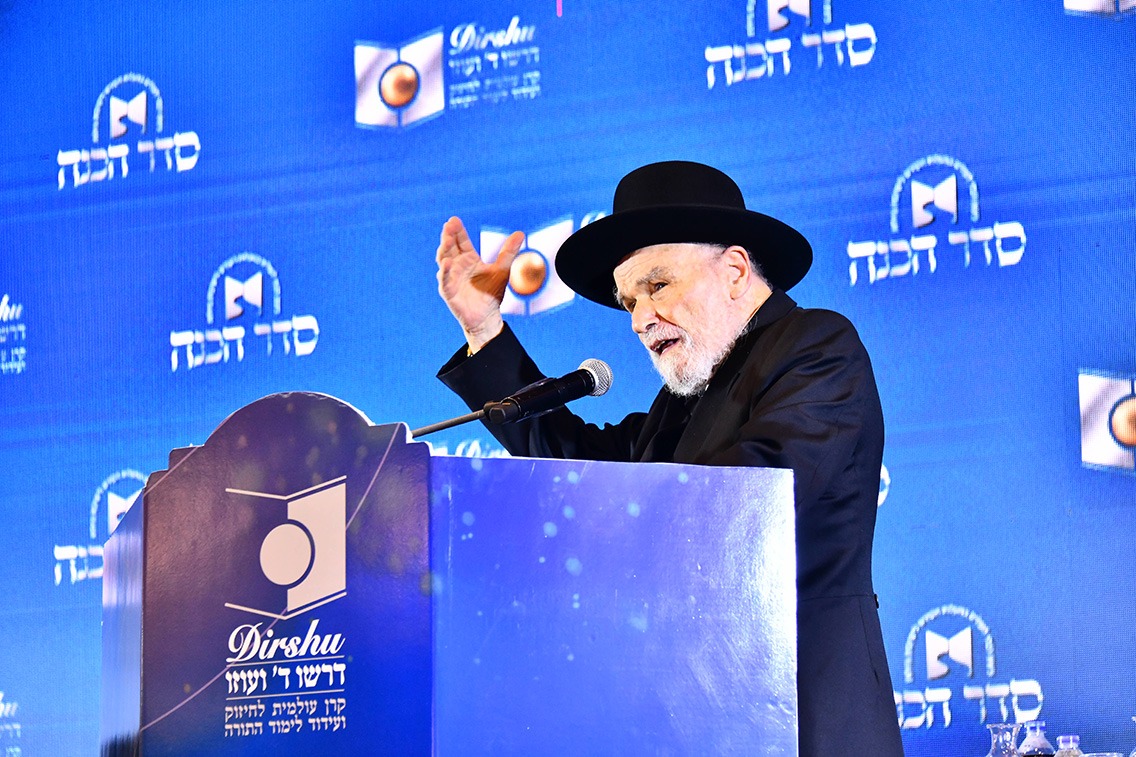Inspirational and Timely Advice from Rav Moshe Hillel Hirsch and Rav Dovid Cohen
By Chaim Gold
It was a sight, a surreal sight. Some 4,000 bachurim, all the same age, graduating yeshiva ketana (12th grade) listening for hours to the passionate words of Gedolei Yisrael, words of advice to elevate them on how to succeed in their transition to the next critical stage in their lives, yeshiva gedolah. The crowd was so large that it had to be split into four different halls in and around the Armanot Chein Halls in Bnei Brak.
One could see the concentration, the connection, and the emotion on their faces as they listened to advice from leading senior Gedolim, HaGaon HaRav Moshe Hillel Hirsch, shlita, Rosh Yeshivas Slabodka; HaGaon HaRav Dovid Cohen, shlita, Rosh Yeshivas Chevron; HaGaon HaRav Nissan Kaplan, shlita; Rosh Yeshivas Daas Aharon; and the special guest Rosh Yeshiva from America, HaGaon HaRav Eliezer Ginsburg, shlita, Rosh Yeshivas Zichron Leyma. Another highlight was the riveting address given by the Nasi of Dirshu, Rav Dovid Hofstedter.
A letter penned by HaGaon HaRav Dov Landau, shlita, Rosh Yeshivas Slabodka, in honor of the event was also read publicly. In addition, there was a unique shailos and teshuvos session where many questions about how to be successful in yeshiva gedolah were posed to the two panel members, HaGaon HaRav Bunim Schreiber, shlita, Rosh Yeshiva of Yeshiva Nesiv Daas, and HaGaon HaRav Chaim Peretz Berman, shlita, a Rosh Yeshiva at the Ponevezh Yeshiva.
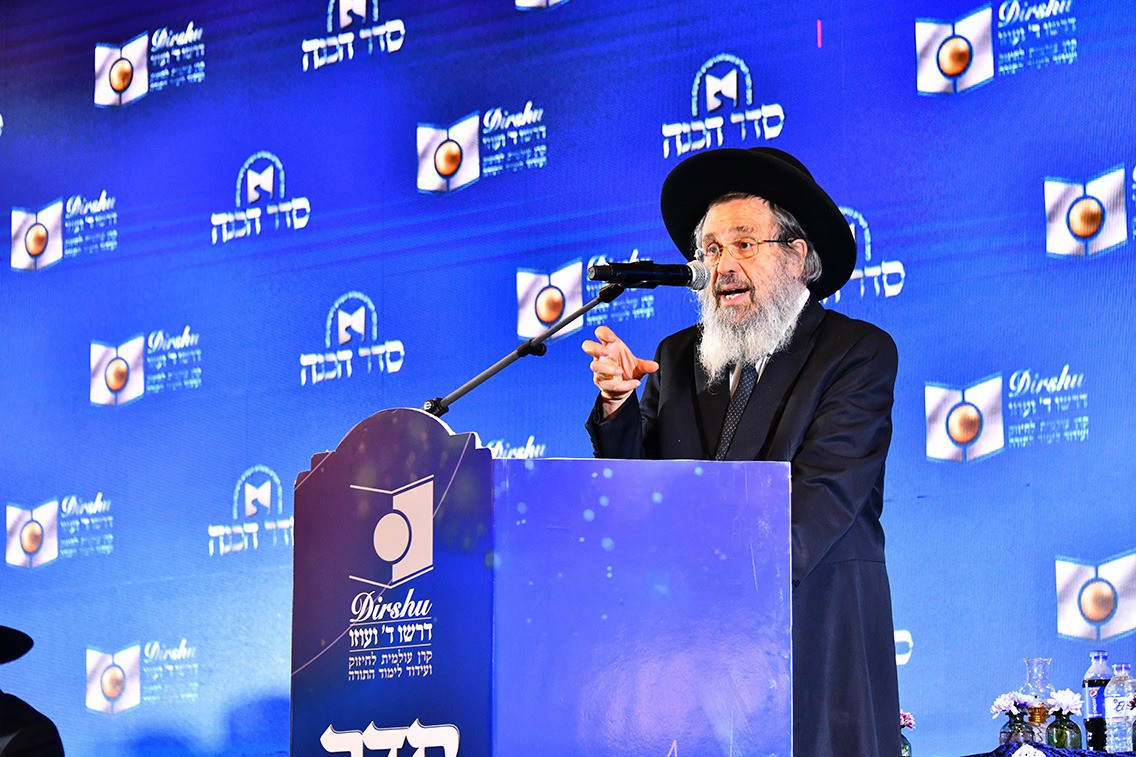
Rav Moshe Hillel Hirsh: Six Pivotal Points for Success
Not even a pin drop could be heard as the chairman of the event, Rav Yisrael Layush, introduced the Rosh Yeshiva of Slabodka, Rav Moshe Hillel Hirsch.
“The first thing a bachur should know,” Rav Hirsch began, “is that in just one month from now, you will be making what might be the most transformative change of your life. One’s entire life is built on the foundation that you make in yeshiva gedolah. I would like to give you several pieces of advice on how best to succeed in yeshiva gedolah.”
Number one was to realize that the foundation for one’s spiritual life is built in yeshiva gedolah. This applies to Torah learning, yiras shomayim, middos and care regarding shemiras hamitzvos. As much as one invests in the foundation that is how tall and strong the building will be.
Number two, a bachur must really understand the purpose of the ostensible “freedom” in yeshiva gedolah in comparison with yeshiva ketana. “Until now you were always under someone’s control. You slept at home and were under your parents. The yeshiva ketanas are very regimented and you are under constant watch. In yeshiva gedolah there is much more ‘freedom’. When a person has more freedom, he likes to think, ‘I will now decide what is good for me and otherwise…’ That is a mistake! That is the yetzer hara talking! A person must make for himself a rav, a guide.
The third point that Rav Moshe Hillel emphasized was that “Yeshiva gedolah is a fresh slate! Even someone who was not so successful in yeshiva ketana is empowered to make a fresh start and should come in with great she’ifos. Never let the past define you.
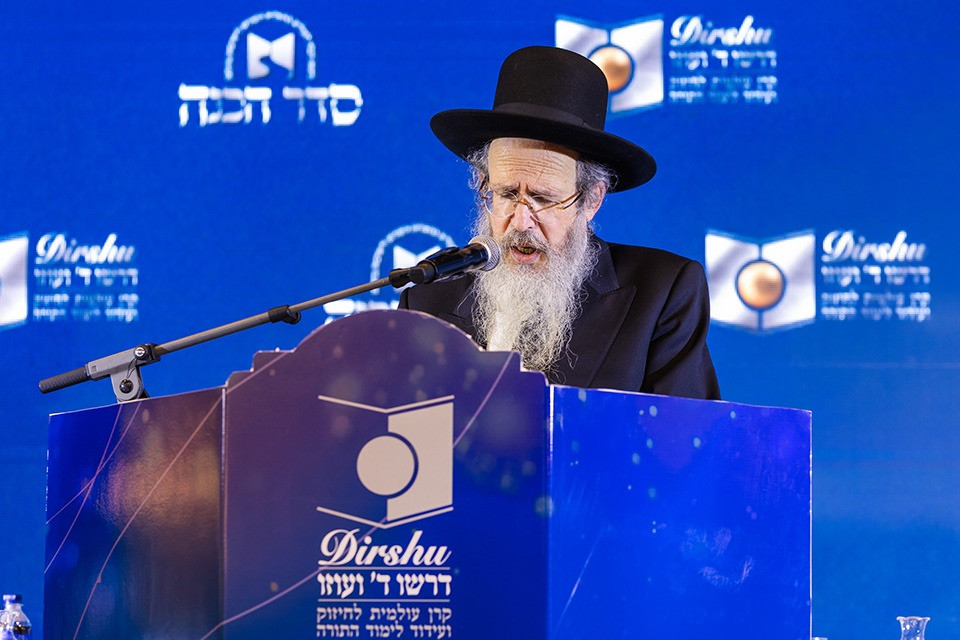
Rav Dovid Cohen: Focus on Your Prime Investment
When listening to the acclaimed rosh yeshiva of Chevron, Rav Dovid Cohen, one could immediately see that he brought with him many decades of experience in regarding bachurim at this stage in life, and his drasha was both practical and uplifting all at the same time.
“Let us try to encapsulate what a yeshiva is,” said Rav Cohen. “some say it is a place where we learn Gemara or learn how to learn Gemara. That is incorrect. Yes, what we primarily do in yeshiva is learn Gemara, but that does not define what is a yeshiva. A yeshiva is not a college, it is a factory, a factory that builds and produces the unique product called a ‘ben Torah’. It is a factory that creates and raises the talmidei chachomim who will continue the mesorah of Klal Yisrael for the coming generation.
Rav Dovid also spoke about social standing in the yeshivos. “In more recent years, I have seen that a bachur’s social standing in the yeshiva has become a big deal. Everyone wants to be looked at as geshmak, normal, a person who people want to be around. I am not minimizing the importance of social interaction to a degree, but the incessant focus on it, not only doesn’t help one’s social standing but ultimately it will hurt his social standing as well.
Rav Nissan Kaplan: Understanding the Difference
Rav Nissan Kaplan, the first speaker of the evening, introduced the topic of the marked difference between yeshiva ketana and yeshiva gedolah. We must learn from Rabi Akiva. He saw the water penetrating the rock. He realized that the key to success was consistency. Do not look around in the beis medrash noticing so many people who are ahead of you and give up because of that. If you are careful to learn one seder to its fullest and then another and then another, all one at time, you will eventually reach the greatest levels as Rabi Akiva did. You will see how Hashem opens the wellsprings of chochma.
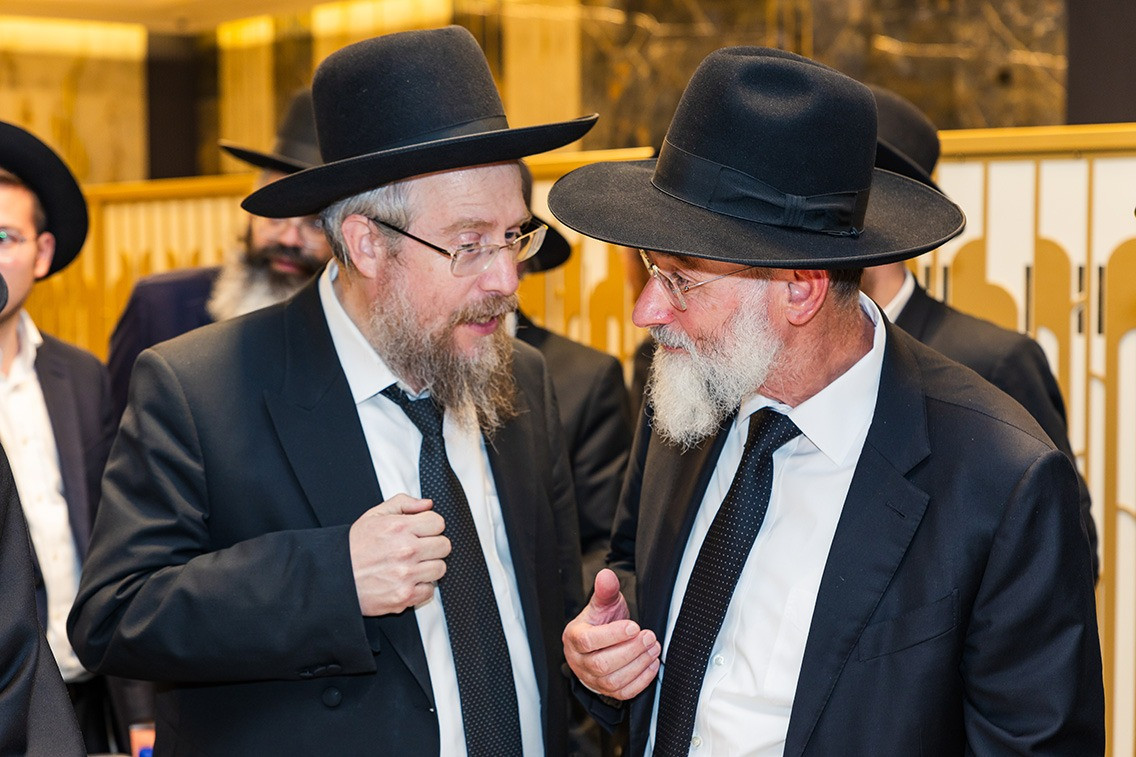
Rav Dovid Hofstedter: Preserving the Old and Simultaneously Rising Higher and Higher
Rav Dovid Hofstedter, the Nasi of Dirshu, then addressed the bachurim.
Rav Hofstedter asked, “At this major juncture in your lives what should your focus be?”
Rav Hofstedter brought several very relevant, practical lessons by analyzing the transfer of leadership between Eliyahu Hanavi and Elisha. In an comprehensive dvar Torah he showed how the pesukim teach us that in order to be able to truly receive ruchniyus from one’s Rebbi requires and avodah.
“When one goes to yeshiva gedolah there is a process of severing ties with the past. One must sever ties with his katnus, with his immaturity, by becoming a true talmid of his Rebbi. .
“At the same time a bachur cannot make the mistake of severing positive connections. A bachur needs to remain attached to the lessons and guidance of both his previous rebbeim and his present rebbeim. They are the ones who teach us Torah, mussar and how to withstand nisyonos.
Independence in yeshiva gedolah does not mean independence from your rebbeim. The transition period to yeshiva gedolah is like the transition of Elisha becoming Eliyahu’s talmid. A bachur must put his katnus behind him but at the same time attach himself with an inseparable bond to the spiritual bounty that he has received and will continue to receive.”
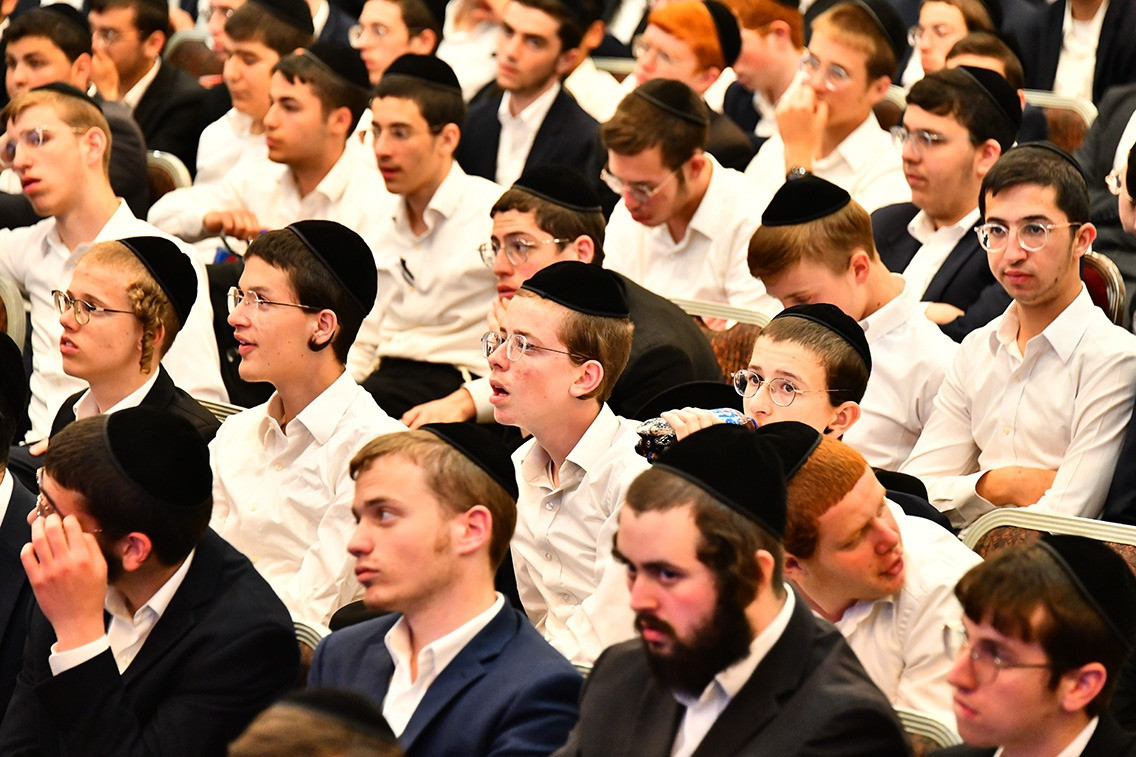
Rav Eliezer Ginsburg: A Maamad of Kabbolas HaTorah!
The final speaker of the evening was Rav Eliezer Ginsburg. He gave a fiery He said, “What would my Zeida, Rav Chatzkel Levenstein, say about such a maamad? He would say that an asifa such as this one is a time for kabbolas haTorah! The time of kabbolas haTorah was certainly not limited to Har Sinai. Chazal teach us that we must look at Torah as if it was given to us today. Now is the time to accept the yoke of Torah upon yourselves. Right now, as you are sitting here.
One could see the smiling, yet earnest faces of the bachurim as they exited after being infused with such divrei chizuk and hearing so many real-life scenarios played out in the question-and-answer session. Their shining countenances displayed how glad they were to have heard practical guidance from the Gedolei Hador on the most important period of growth in their lives!
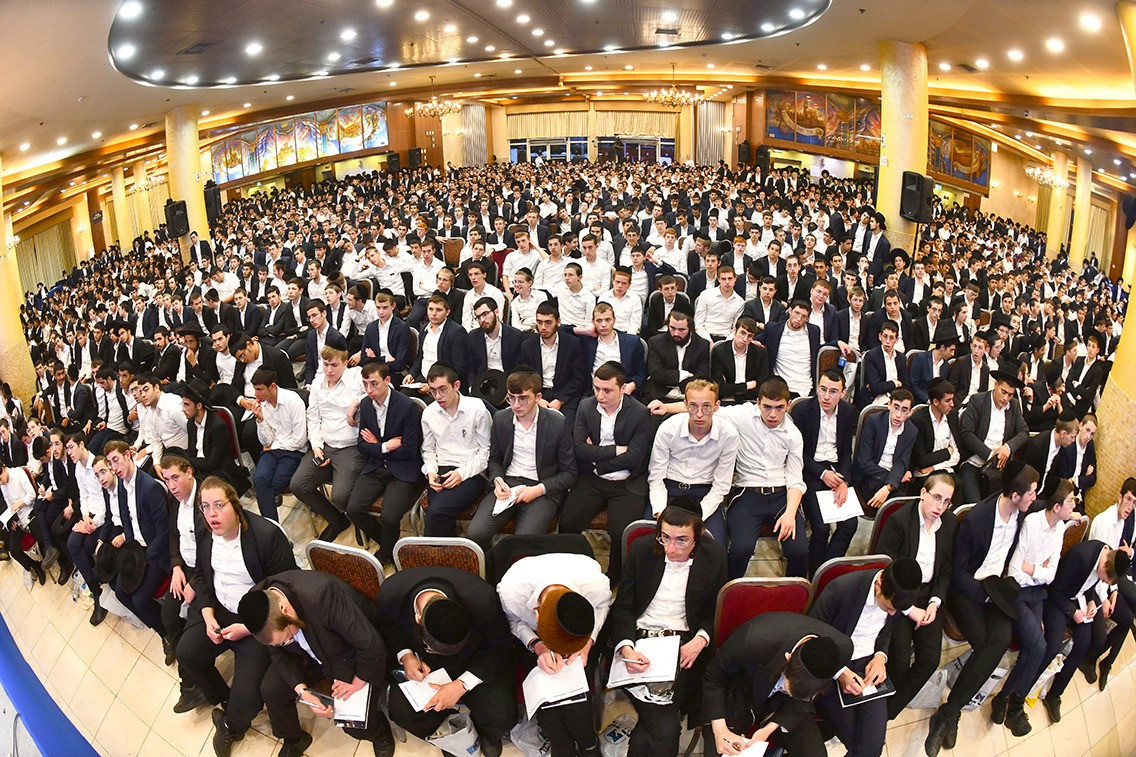
Fortunate is the generation where the young listen to the elders.
Click here to view the Dirshu Seder Hachana videocast.

